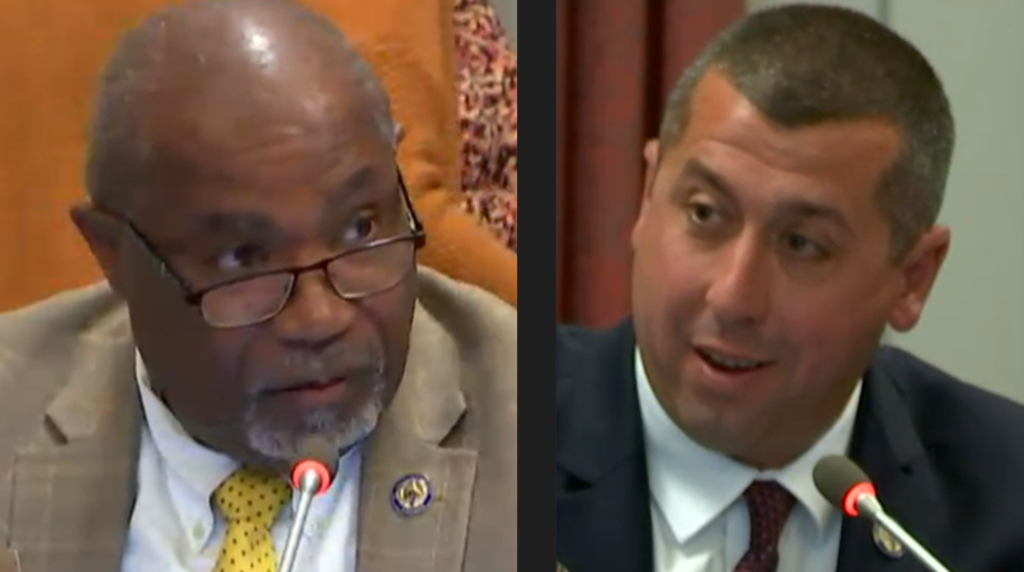Appropriations Committee Argues over Police and Polling Place Provision

The Assembly Appropriations Committee this afternoon released A2131, which enables police officers to be present at senior residential center or school being used as polling place under certain circumstances; requires school to establish election day security plan.
The bill came in response to a voting reform package signed earlier this year by Governor Phil Murphy.
"While this bill rolls back some of this provisions it doesn't go far enough," complained Assemblyman Brian Bergen (R-25), who argued that GOP lawmakers presented reasonable amendments.
"You seek to oppress anything we try to do," Bergen told his Democratic Party colleagues. "I find it appalling that a small left faction.. has a vice grip on your policies related to policing. I object to how you treat our police officers fundamentally. I vote yes because it's a small step forward."
Assemblyman Kevin Rooney (R-40) and Assemblyman Jay Webber (R-26) concurred.
"We will give you every opportunity to improve this bill on the floor," said Webber.
The League of Women Voters opposed the bill because of perceived voter suppression that could arise as a consequence of a stepped police presence at polling places.
"I am mindfully aware my colleagues on the other side of the aisle see this as fodder; I am troubled at voting against the League of Women Voters," said Assemblyman Gary Schaer (D-36). "They are concerned about assumptions."
Assemblywoman Carol Murphy (D-7) said, "This is not a referendum on our police. I have the utmost respect for them and communicate with them on our bills. We do need to have police officers in our schools when it comes to polling centers. These are people in need of the most protections."
"This bill is about protecting our youth and our seniors," said Assemblywoman Angela McKnight (D-31).
Added Assemblyman Herb Conaway (D-7), "We continue to hear from colleagues on the other side that they disrespect the lived experiences who don't share the lived experiences. Persons of color will have negative interactions with police. Police have been involved shootings where by and large the people dead are people of color."






The researchers also asked about the future role of firearms “in a situation where you think force or violence is justified to advance an important political objective.” Nearly 15 percent of strong Republicans said it was “very or extremely likely” that they will be armed with a gun in such a situation, while only 5 percent of strong Democrats said the same. Personal willingness to threaten or shoot someone with a gun was uncommon, the survey found, with no statistically significant variation by party affiliation.
WHAT IS VOTER INTIMIDATION? Federal law says that "no person ... shall intimidate, threaten, coerce ... any other person for the purpose of interfering with the right of [that] person to vote or to vote as he may choose." Many states have their own laws prohibiting voter intimidation. Voter intimidation is rare and unlikely. But if someone is attempting to interfere with your or anyone’s right to vote, it may be voter intimidation and a violation of federal law. Examples of intimidation may include: • aggressively questioning voters about their citizenship, criminal record, or other qualifications to vote , in a manner intended to interfere with the voters’ rights • falsely presenting oneself as an elections official • spreading false information about voter requirements, such as an ability to speak English, or the need to present certain types of photo identification (in states with no such requirement) • displaying false or misleading signs about voter fraud and the related criminal penalties • other harassment, particularly toward non-English speakers and voters of color WHO CAN I REPORT INTIMIDATION TO? You can report intimidation to: • The Election Protection Hotline: 1-866-OUR-VOTE or 1-888-VE-Y-VOTA (en Español) • The U.S. Department of Justice Voting Rights Hotline: 800-253-3931; TTY line 877-267-8971 • Local and state officials, including poll workers; your county clerk, elections commissioner, elections supervisor; or your state board of elections WHO CAN BE A POLL MONITOR? In many states, poll monitors must be trained and certified by a political party or a candidate, and must carry their certification paperwork with them. In many states, poll monitors must also be registered voters in the state or county where they are monitoring the polls. WHAT CAN POLL MONITORS DO? Generally, certified poll monitors are allowed inside the polling place, but states may limit the number of poll monitors per candidate/ party at any given time. In many states, certified poll monitors may inspect the pollbooks. In many states, certified poll monitors can challenge the qualifications of voters. Unofficial/self-designated election observers are not permitted inside a polling place.
The best way for authority figures to be perceived as non partisans is to simply keep a respectful discreet distance from active polling stations. In the example of Millburn Police Lt Fattal he assembled a repeated mob action in the muni parking lot at the drop box and on into BOE chambers in support of his Block 3 candidacy under the very noses of the 8 Wayne police hired by the BOE to keep order. Lt Fattal is the poster boy for what is wrong with sworn police from being within polling stations IMO